Ruth Hull Chatlien's Blog, page 6
October 27, 2021
Researching a Character’s Look
One thing I love about writing a novel set in the mid-twentieth century is researching the characters’ clothes. Currently, I’m having fun dressing my main character’s mother. She’s a self-absorbed character who feels overwhelmed by her large number of children, so her clothes are one of her few methods of self-expression. Here are two of the outfits I chose for her. The time period is early to mid 1940s.
The following outfit is one that she wore to a doctor’s appointment: the navy polka dot dress on the right, but with a different hat than the one shown on the pattern. I see her wearing a saucer hat like the one shown, but in navy with a white bow at the back.


The outfit below is one she wore to church in the summer. It’s a sleeker style because by 1944, fashions were trying to accommodate the need to use less fabric because of the war. The shoes I chose are made of fabric, not leather, for the same reason. White gloves not black. And her shoes are the red sling-back pumps with pom-pom bow in the lower left corner.


October 24, 2021
Sunday Review: Mexican Gothic by Silvia Moreno-Garcia
In this week before Halloween, I’ve decided to post a review for a book I read a few months ago: Mexican Gothic. Set in the 1950s, the novel takes a classic gothic plot line but transports it to Mexico—a young woman travels to a mysterious house and uncovers a secret horror that ends up threatening her life and freedom.
Noemí Tabada is a popular and charming debutante in the highest levels of Mexican society, known for her beautiful clothes and many admirers. When her recently married cousin Catalina sends a letter home describing bizarre and dangerous happenings in her new husband’s family estate, Noemí’s father sends her on a mission to see if Catalina is losing her mind. When she first arrives, Noemí has a difficult time finding anything wrong, except that no one wants to let her spend time alone with the cousin she came to see.
Of course, things don’t stop there. Noemí begins to have terrible nightmares and to suspect that something is very, very wrong beneath the surface. I won’t say more because I don’t want to spoil the book’s effect.
To be honest, when I read it, I struggled with my reaction to this novel. Parts of it are incredibly disturbing and distasteful, but … that’s kind of the point. In the end, I came to see it as an exploration of the survival instinct. On the one hand is one person’s deformed survival instinct, grown bloated, diseased, and parasitical, which fuels all the weirdness. On the other hand is the main character’s strong but still-within-the-bounds-of-reason survival instinct, fueled by courage, love, and her own indomitable will. I’m glad I read it, but the last section of the novel is not for the faint of heart.
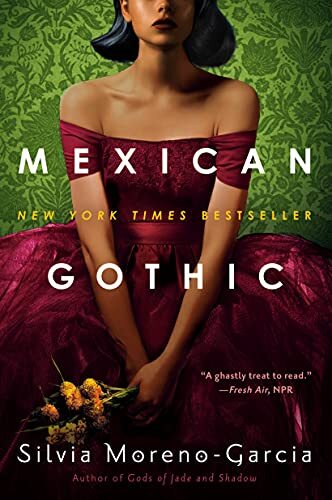
October 20, 2021
A Research Gem about WWII Induction
I’ve started writing my next novel. At this point, I’m not sure I’ll continue with this storyline, but for now, I’m working on a possible prequel to Katie, Bar the Door that tells her mother’s story. Because it’s set further back in time (1939 to 1956), I’m having to do more research the way I did with my two historical novels. The other day, I was trying to figure out the process Marietta’s uncle would go through when he was inducted into the army during WWII. Lo and behold, I found this great little informative film.
October 17, 2021
Sunday Review: The Limits of Limelight by Margaret Porter
I’m a lifelong fan of old movies, so when I learned that Margaret Porter was writing a novel about Phyllis Fraser, Ginger Rogers’s cousin, I was eager to read the book and bought it soon after it was published. Phyllis, born Helen Nichols, was an Oklahoma City high school student when her cousin and aunt cooked up a plan to bring her to Hollywood and make her a star. I was intrigued because, although I’ve seen countless Ginger Rogers movies, I’d never heard of her younger cousin.
There’s a good reason for that. Although Phyllis finds fairly steady work as an actress because of her family connections, she doesn’t achieve anything like the status of her more-famous relative. Even so, her story is quite interesting. She becomes part of a group of “baby stars,” hopeful starlets being groomed by the studio yet struggling to break out of the pack. One of her closest friends was Anne Shirley, the former Dawn O’Day who changed her name to match that of the most famous character she portrayed. Anne pursues romance with a handsome actor as well as success on screen. Then there is Peg Entwistle, an ethereal English beauty who longs to return to to the Broadway stage and whose fate has become Hollywood legend (read the novel to find out why). Katharine Hepburn also wanders in and out of the story, first as a rival who feuds with Ginger Rogers and then as someone trying to shed her reputation as “box office poison.”
Phyllis is a refreshingly down-to-earth girl, called “Oklahoma wholesome” by one of her many suitors. Although she enjoys the Hollywood social scene, she has few illusions about the depth of her talent nor does she let any young man, no matter how charming, rush her into a relationship she’s not ready for. Before moving to Hollywood, she had non-acting career goals, and as she gradually learns that the lure of limelight has its limits, she must decide whether to continue pursuing acting or to try building a reputation in a completely different field.
Ginger Rogers and her mother Lela are strong presences in the novel. Lela, who had served in the Marines during World War I is a daunting personality who serves as her daughter’s manager and fights for Ginger’s career with relentless determination. Ginger—the ultimate quadruple threat, a massively talented performer who sings, dances, and acts in both comedy and drama—is ambitious and hard working. She’s less successful in her romantic life, as the novel makes abundantly clear.
The book is an enjoyable fast read, perfect for TCM subscribers and students of Hollywood history. The characters are well drawn and vidid. Phyllis herself is likable, and I found that the path she eventually chooses provides a satisfying ending to the novel.
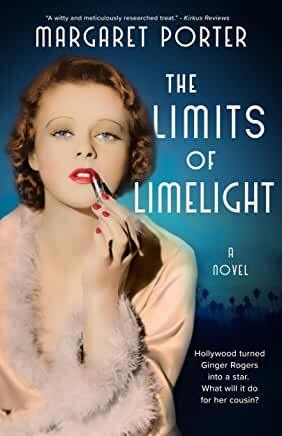
October 10, 2021
Sunday Review: The Medicus Series
Today, rather than reviewing one book, I’m going to talk about the Medicus series of historical mysteries by Ruth Downie, set in the Roman Empire in the second century of the common era. We first meet Gaius Petraius Ruso, a physician (or medicus) from Gaul, when he is assigned to a legion in Britannia. Ruso is a wry, unassuming man who just wants to earn a decent living to help out his family in Gaul, left in debt after his father dies, and to forget his failed marriage to a woman who had far more ambition than he does and regarded him with scorn for not rising faster in his career. He hopes working at a routine institutional job will give him the time he needs to focus on compiling a medical guide that will salvage his finances and reputation—as well as helping other physicians.
Life in Britannia quickly proves more complicated and dangerous than Ruso anticipates. His soft heart leads him to purchase a blonde slave girl with an unpronounceable British name from her abusive master with the intention of saving her severely injured arm. Thus we are introduced to the second main character, quickly rechristened Tilla.
When young women at a local bar near the military outpost start turning up dead, Ruso somehow ends up investigating the crimes. This in turn gives him a reputation as a detective that he dearly wants to disavow but which follows him throughout the course of the series, disrupting his plans to be just a good doctor.
As does Tilla, who evolves from a distrustful housekeeper with no domestic skills to Ruso’s partner in more ways than one. She views every injustice with sharp indignation, and she has a knack for annoying the authorities and going her own headstrong way, further injecting chaos into the life of the man she lives with.
The series meanders to Ruso’s family home in Gaul and even to imperial Rome but always seems to come back to Britannia, touring some of the ancient high spots such as Hadrian’s wall (then under construction) and Aquae Sulis (now known as Bath).
The stories are fast reads, and humor makes up a large part of every book. Downie’s use of eccentric characters to people her world reminds me a bit of Dickens. Some of the most memorable of those characters are recurring. Life in the ancient Roman empire is depicted in vivid but not overwhelming detail. Most importantly, by the time I reached the third or fourth book, I found myself missing Ruso and Tilla between reads. To me, that is always the sign of a good series.
Read the books in order to avoid confusion and to be able to follow the characters’ development:
Medicus
Terra Incognita
Persona Non Grata
Caveat Emptor
Semper Fidelis
Tabula Raza
Vita Brevis
Prima Facie (a novella, rather than a novel)
Memento Mori
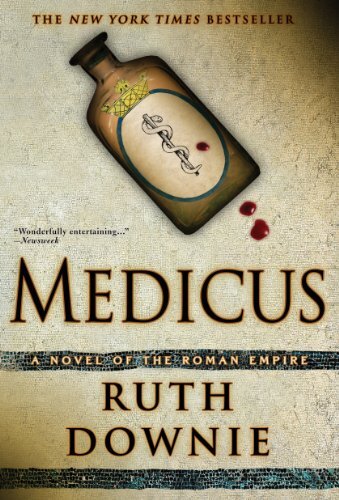
October 3, 2021
Sunday Review: Chasing the Wind by C.C. Humphreys
This is like a cross between one of those early movie serials—all action and peril—and a historical novel set between the world wars. The heroine is a risk-taking, cigarette-smoking, whiskey-drinking, adventure-loving aviatrix who flees America after her father is killed, leaving her with a mountain of debt she can’t repay.
Her adventures take her to Africa, Spain, the 1936 Berlin Olympics, and aboard the Hindenburg on its fateful voyage—and along the way she encounters smugglers, art forgers, saboteurs, Nazis, and her family’s arch enemy.
Don’t expect a serious portrayal of the politics of Europe in the late 1930s. But if you’re in the mood for a fast-paced, fun romp on the order of Raiders of the Lost Ark, this is the book for you.
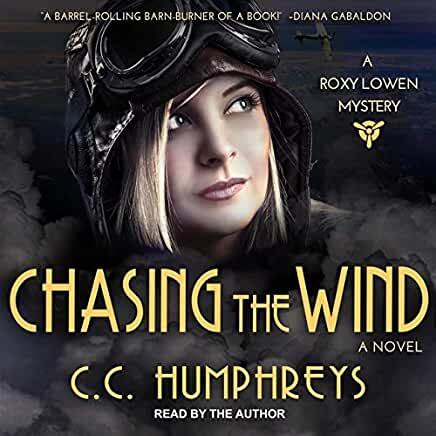
September 26, 2021
Sunday Review: The Madness of Crowds by Louise Penny
Although I am a longtime fan of Louise Penny’s Armand Gamache series, over the last few years I’ve felt less enthusiastic about some of the books. I know that it’s very hard to keep a series fresh, but the pivot to having several plots about massive conspiracies didn’t appeal to me as much as her earlier work. (Your mileage may vary.)
With this novel, I think Penny struck a better balance. First, it’s set back in Three Pines, so we get to catch up with the cast of eccentric characters there. Second, the issues she explores juxtapose a debate over policies that would have national significance with the moral cost to individuals of participating in or fighting against those policies. (I am being deliberately vague to avoid spoilers.) Several characters come face to face with shadowy things hidden in their own psychological depths—reasons for their behavior that they would prefer not to admit. This isn’t unusual in a Louise Penny novel, but I found these revelations particularly poignant.
This is one series I strongly recommend reading in publication order. And I do still recommend it. Because of this latest installment, I am looking forward again to the next Gamache book.
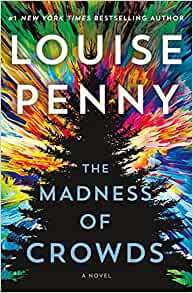
September 25, 2021
A Visit with Anna Belfrage
I did a guest post on Anna Belfrage’s blog yesterday. We became acquainted on social media through our network of historical novelists. To read the post, you can click here.

September 22, 2021
Release Day: Katie, Bar the Door

Today is publication day for my third novel—Katie, Bar the Door, a work of contemporary women’s fiction.
You can order the book in Kindle or paperback here: https://bit.ly/order_KBtD (The Kindle is live now; the paperback will be up in a day or two.)
Summary: From a childhood of parental loss, religious repression, and sexual shaming, Katie Thompson suffers deep wounds and persistent self-doubt. Her desire to find meaning through education and a career is threatened by those who push her to conform to a more traditional path. In her desperate search for love, Katie makes disastrous choices about men, leading her to the brink of self-destruction. Her journey through Katie, Bar the Door is the universal quest for healing and hope as she struggles to save herself and her dreams.
ADVANCE PRAISE
“The full circle of love, loss, and forgiveness left me with a great deal of hope and heart-swell.”—Kelly Fumiko Weiss, Windy City Reviews
“An admirable literary feat”—Jodi Daynard, The Midwife’s Revolt
“Tackles the cost of secrets and silence in this raw yet tender coming-of-age story”—Pat Wahler, I Am Mrs. Jesse James
“A gut-punching, white-knuckled labyrinthine tale of Katie’s tormented, guilt-ridden passions”—Nina Romano, The Girl Who Loved Cayo Bradley
“Manages to offer the reader both deep psychological insight and a page-turning narrative”—Barbara Monier, The Rocky Orchard
Radio Interview with Susan WingateTo mark the book launch, I was interviewed toady on blog talk radio by the fabulous Susan Wingate. Click on the image to go to the interview.

September 19, 2021
Sunday Review: His Castilian Hawk by Anna Belfrage
This is the second novel I’ve read by Belfrage, and both have been highly enjoyable. A few weeks ago, I was going through a stressful period at work, so I wanted a book that would take me away from my worries. The description of this one intrigued me. I haven’t read many novels set during the reign of Edward I of England.
The opening chapters set up an unlikely marriage: bastard-born Robert FitzStephan, one of Edward’s soldiers, and Eleanor d’Outremer (Noor), a half-English, half-Spanish noblewoman who is left alone in the world after Robert kills her father and brother as they charge at the king without warning. To reward Robert’s loyalty, the king tells him to marry Eleanor and take possession of her lands. With such a complicated beginning, it’s no surprise that the marriage starts out poorly. Robert already has a beautiful bedmate, Edith, of many years duration, who is a good friend as well as lover. And initially, he’s not impressed with the smaller and quieter Noor, so he makes mistakes that wound her deeply.
However, beneath the quiet exterior, Noor is a complex, feisty character, and Robert is a man of principle who regrets hurting her. He eventually realizes that he must woo his wife and set Edith aside. Which is when the complications truly begin. The manipulative Edith has no intention of slinking away quietly now that Robert is a wealthy man. And Noor is related to the Welsh princes who are fighting a losing battle to keep Wales free of English domination. When one of those princes comes clandestinely to her castle to request a favor based on kinship ties—that she save his youngest child, whom he has kept secret from the world—she makes a difficult choice that puts her marriage in further peril by embroiling her and Robert in the cutthroat politics of the day.
The characters of both Robert and Noor have wonderful arcs, full of personal growth and change. The time period is fascinating. I appreciated learning more about the conflicts between England and Wales. This book was exactly what I wanted: a solid historical novel with just enough romance to spice it up. I look forward to the publication of its sequel, The Castilian Pomegranate.




